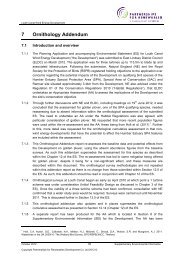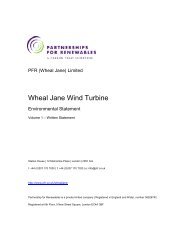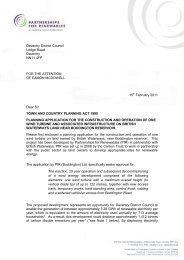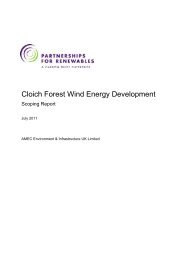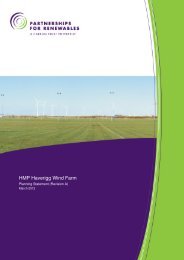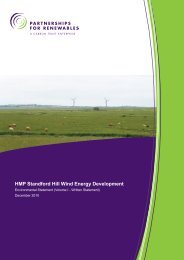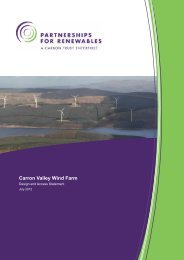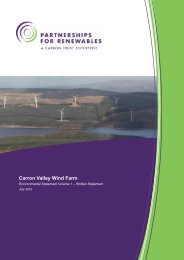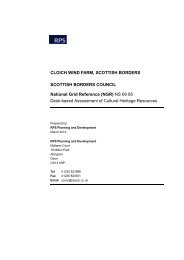Planning Supporting Statement - Partnerships for Renewables
Planning Supporting Statement - Partnerships for Renewables
Planning Supporting Statement - Partnerships for Renewables
Create successful ePaper yourself
Turn your PDF publications into a flip-book with our unique Google optimized e-Paper software.
Louth Canal Wind Energy Development<br />
4 UK Commitment to Tackling Climate Change<br />
4.1 Overview<br />
4.1.1 The UK Government is strongly encouraging the generation of energy from renewable sources<br />
and the reduction of the emission of gases that contribute to climate change. This support<br />
<strong>for</strong>ms a key element of the UK Climate Change programme and is outlined in the Energy White<br />
Paper, the Energy Review and <strong>Planning</strong> Policy <strong>Statement</strong> 22: Renewable Energy. The<br />
<strong>for</strong>mation of the Department <strong>for</strong> Energy and Climate Change (DECC) in October 2008 reflects<br />
the importance of tackling climate change and the need to secure clean, safe, and af<strong>for</strong>dable<br />
energy.<br />
4.2 The Stern Review<br />
4.2.1 The Stern Review on the economics of climate change (2006) highlighted the challenges faced<br />
by climate change and the policy direction required to initiate a transition to a low-carbon<br />
economy and thus reduce the extent of future climate change. The review highlighted the very<br />
need to reduce future carbon emissions to reduce the level of global warming and also control<br />
the extent to which future climate change affects human activity and the country‟s<br />
infrastructure. For the UK, the Stern review highlights the following potential implications of<br />
climate change:<br />
Infrastructure damage from flooding and storms is expected to increase substantially,<br />
especially in coastal regions, although effective flood management policies are likely to<br />
keep damage in check.<br />
Water availability will be increasingly constrained, as runoff in summer declines,<br />
particularly in the South East where population density is increasing. Serious droughts<br />
will occur more regularly.<br />
Milder winters will reduce cold-related mortality rates and energy demand <strong>for</strong> heating,<br />
while heat-waves will increase heat-related mortality. Cities will become more<br />
uncom<strong>for</strong>table in summer.<br />
Agricultural productivity may initially increase because of longer growing seasons and<br />
the carbon fertilisation effect but this depends on adequate water and requires<br />
changing crops and sowing times.<br />
4.2.2 The Stern review highlights the particular challenges which will be faced by infrastructure<br />
providers in continuing to maintain and provide the infrastructure required in the light of<br />
increased global warming:<br />
“The consequences of climate change in the developed world are likely to be felt earliest and<br />
most strongly through changes in extreme events - storms, floods, droughts, and heat waves.<br />
This could lead to significant infrastructure damage and faster capital depreciation, as capitalintensive<br />
infrastructure has to be replaced, or strengthened, be<strong>for</strong>e the end of its expected<br />
life.” 3<br />
3 The Stern Review, Chapter 5, Page 10, available at: http://www.hm-treasury.gov.uk/stern_review_report.htm<br />
March 2012 7 <strong>Planning</strong> <strong>Supporting</strong> <strong>Statement</strong><br />
Copyright <strong>Partnerships</strong> <strong>for</strong> <strong>Renewables</strong> Development Co. Ltd 2012 ©



